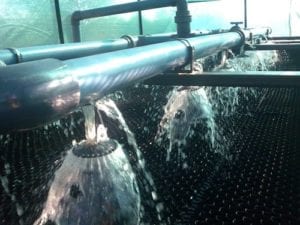In a logistical feat, a large mining project in the Democratic Republic of Congo has received a total of seven modular water treatment plants – four to treat domestic sewage, and three for supplying drinking water – from Veolia Water Solutions & Technologies South Africa, a subsidiary of Veolia Water. The plants will service construction and operations camps in the area.
Six of these plants will be installed at a construction-phase gold mine in the north eastern Democratic Republic of Congo to support construction, maintenance and operations staff, while one of the drinking water plants will be installed at an important trading post nearby. The largest of the wastewater plants will treat 3 000 litres per hour to serve roughly 300 people. “These plants use trickling filter technology that is ideally suited for operation in Africa,” says Warrick Sanders, Project Engineer at Veolia. “Trickling filter plants are robust and recover easily from power cuts with minimal disruption to the biological processes. With typically one to two sets of motors being the only moving parts, these plants need minimal maintenance.” Plastic honeycomb carrier elements, designed for high-performance biological growth, facilitate the aerobic treatment which breaks down organic matter and supports nitrification. After the subsequent clarification process to remove accumulated biomass, water is disinfected with chlorine and discharged, while any sludge is fed back into the system for re-digestion. This discharge typically conforms to South African general standards for effluent discharge into natural water sources.Veolia was also contracted to supply septic tanks which form a pre-treatment step by facilitating anaerobic digestion of COD (chemical oxygen demand) and BOD (biochemical oxygen demand).
The three drinking water plants will source water from boreholes: filtration will remove any sediment, while chlorination will ensure water is disinfected and suitable for human consumption. Veolia’s modular plants are assembled to 95% completion at the company’s Sebenza factory in Johannesburg. They are completely containerised for easy transportation and scalability, and need minimal setup once on site. “A decentralised plant has been used on this site to generate potable water for other areas of the plant,” says Sanders. “These plants can also be relocated to a different camp site once construction or other operations have been completed.” The plants have been shipped from Durban to Mombasa, and forwarded to the main site. “Because of the road infrastructure between the port and the mine site, we had to reinforce the plants’ internal systems to ensure minimal damage during transportation,” concludes Sanders.






